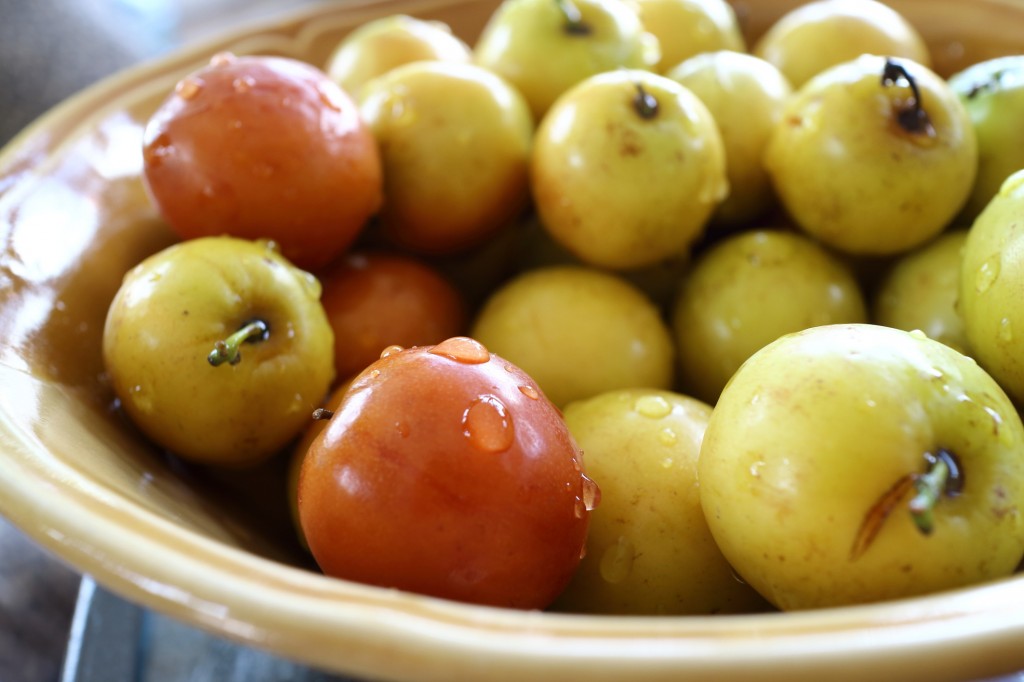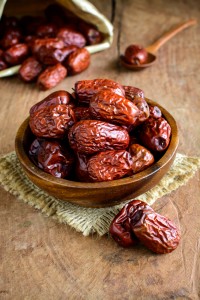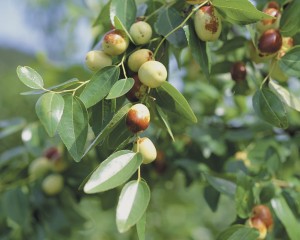Jujubes: Fruits with Benefits


The Chinese have been growing and eating jujubes for over 4,000 years. Jujube, or Chinese date, trees are shrub-like with thorny branches. The fruits are shaped like small apples that are green when unripe and turn brownish red. As they ripen and age they wrinkle and shrink to the size of a large date. The flesh of the fruit is most like an apple when it’s unripe. As it ripens it becomes soft and spongy.
 Asians generally steep slices of jujubes in hot water and make a jujube tea. Sometimes they reduce the tea on the stove and add sugar, creating jujube syrup that can be used in other teas. They believe that jujube strengthens the stomach, cleanses the blood, and extends life. They use jujube tea as a sedative and to alleviate stress and heal wounds. Other cultures also recognize jujubes’ benefits. Persians use jujubes to combat colds, flu, and coughing. In the Middle East, jujubes are eaten as a snack either fresh or dried.
Asians generally steep slices of jujubes in hot water and make a jujube tea. Sometimes they reduce the tea on the stove and add sugar, creating jujube syrup that can be used in other teas. They believe that jujube strengthens the stomach, cleanses the blood, and extends life. They use jujube tea as a sedative and to alleviate stress and heal wounds. Other cultures also recognize jujubes’ benefits. Persians use jujubes to combat colds, flu, and coughing. In the Middle East, jujubes are eaten as a snack either fresh or dried.
Recent science has revealed that jujubes are a good source of antioxidants (essential to our FoodTrient program), as well as the FoodTrient potassium, an electrolyte that helps the body retain calcium for strong bones, lower blood pressure, and enhance nerve and muscle function. Jujubes also contain the minerals phosphorous (for muscle growth and contraction), calcium (great for bones), zinc (which boosts immunity), as well as manganese, iron, and copper, and good amounts of vitamins B1, or thiamine (which helps metabolize sugar), B2, or riboflavin (which produces energy within cells), and the FoodTrients vitamins C (which increases resistance to infection) and A (which keeps eyes healthy). Jujubes also have special compounds (which alleviate anxiety and insomnia) and phytochemicals (which strengthen the liver, helping that organ purify the blood and detoxify the body).
 Near my house is a large Chinese community, where many residents grow jujube trees in their backyards. If you don’t live or work near an Asian community or an Asian market, go to www.melissas.com to order jujubes online. They’re in season from August throughout October. Unripe jujubes are not as sweet as the wrinkly, ripe ones, but I prefer them slightly unripe. I like to make a stock out of them for soups, especially fish soups. If you prefer the ripe, sweeter jujubes, you can treat them like apples. Simmer them in water to make a jujube version of applesauce. Or simply substitute fresh jujubes for apples in apple-cake recipes. Or do like the Chinese do and steep fresh or dried jujubes in hot water for 10 minutes. Discard the fruit and drink the sweet tea as a health tonic. Enjoy!
Near my house is a large Chinese community, where many residents grow jujube trees in their backyards. If you don’t live or work near an Asian community or an Asian market, go to www.melissas.com to order jujubes online. They’re in season from August throughout October. Unripe jujubes are not as sweet as the wrinkly, ripe ones, but I prefer them slightly unripe. I like to make a stock out of them for soups, especially fish soups. If you prefer the ripe, sweeter jujubes, you can treat them like apples. Simmer them in water to make a jujube version of applesauce. Or simply substitute fresh jujubes for apples in apple-cake recipes. Or do like the Chinese do and steep fresh or dried jujubes in hot water for 10 minutes. Discard the fruit and drink the sweet tea as a health tonic. Enjoy!
